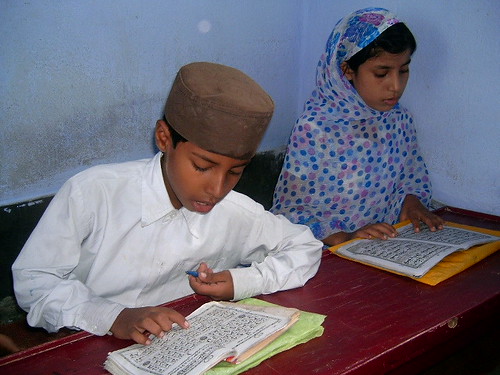By Imran Khan, IANS,
Patna : Away from swank colleges and intimidating fee structures, a number of Hindu students in Bihar are lining up at madrassas to pursue higher education, thanks to revamped courses, nominal fees and job opportunities in the Gulf.
“I will complete Alim (equivalent to graduation) degree course from a madrassa. It is affordable and will provide an opportunity to enrich my knowledge,” 19-year-old Sanjay, the son of a Hindu trader in Bettiah district, told IANS.
Sanjay took the plunge after topping the Class 12 Maulvi examination conducted by the Bihar Madrassa Education Board in the non-Muslim category this year.

Hindu students of Madrasa Madinatul Uloom of Bihar
Sanam Kumari, 18, a Dalit girl, also joined a madrassa after she secured third rank in Maulvi exam.
Ask her why a madrassa and pat comes the reply. “My aim is to become an Urdu teacher,” says Sanam, the daughter of a farmer in West Champaran district.
Madrassa board officials say non-Muslims, particularly upper caste Brahmins in the Mithilanchal region of north Bihar, are keen on sending their children to madrassas to learn Arabic, Persian, Islamic traditions along with other modern subjects with an eye on jobs in the Gulf and in the embassies of Muslim nations.
The enrolment of Hindus at madrassas is increasing.
Maulana Ajaj Ahmad, chairman of the Madrassa Education Board of Bihar, told IANS: “Non-Muslims, particularly Hindu boys and girls in large numbers, are studying in different madrassas across the state. It is a positive development as their enrolment is increasing every year.”
The trend began about a decade ago. According to sources, Bihar has over 4,000 madrassas, including 1,127 state-run Islamic schools where students are provided free books and mid-day meals.
“After a few Hindu students passed from the seminaries, they propagated our humane approach. In fact, we are not teaching anything against any religion or anything anti-national as is claimed by some vested interests to defame us,” Ahmad said.
Hindu fundamentalist organisations have frequently accused madrassas, particularly those along the India-Nepal border, of being nurseries of terror.
“But after their children joined madrassas, Hindus are finding much to their surprise that these seminaries do not preach hatred towards them or their beliefs,” he added.
Ahmad said Hindu students were doing very good in board examinations. “A Hindu girl, Anjali Raj, secured the first rank in Class 10 (Fauquania) level examination in the non-Muslim category this year. Her performance was amazing,” he said.
Madrassa Board’s examination controller Mohammad Mustafa said like Muslim girls, Hindu girls have also outperformed boys in examinations held by the board.
This year, over 40 Hindu students cleared the Fauquania examination and 16 Hindu students cleared Class 12 (Maulvi) examination.
Ahmad said the seminaries attract both the elite and the downtrodden among Hindus. “Madrassas provide education at the doorstep free of cost, which is specially attractive to the poor and marginalised sections like Dalits and backwards.”
The state government recently decided to provide financial support to 2,700 unaided madrassas.
According to the first-ever status paper brought out by the Bihar State Madrassa Education Board, there are only 32 madrassas for girls under the government-aided category and 576 in the unaided category.
According to the 2001 Census report, Muslim women have a literacy rate of 50.1 percent in India. The situation in Bihar is even grimmer with the percentage dropping to 31.5 percent.
Though the central government began the process of modernising madrassas way back in 1994, the Bihar government introduced it in early 2002.
Under the modernisation scheme, the course was revised to keep it in tune with the curriculum prescribed by the Bihar School Examination Board and the Central Board of Secondary Education.
“Now we teach all the modern subjects, including the sciences, social science, mathematics,” Ahmad said.
Sanjay, who secured 893 marks in the Maulvi exam, said: “I will be entitled to a teacher’s job in government schools and will qualify for private jobs after I complete Alim. Besides, I can pursue an MBA as well.”
(Imran Khan can be contacted at [email protected])

